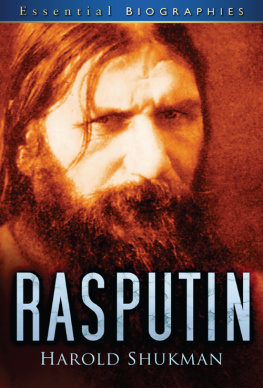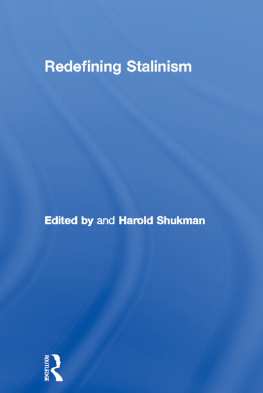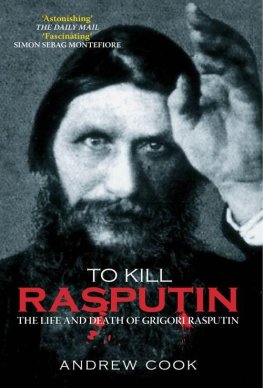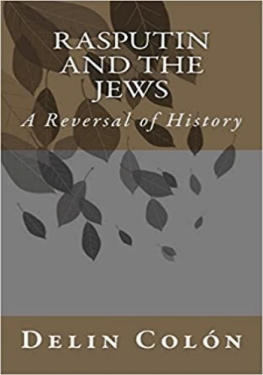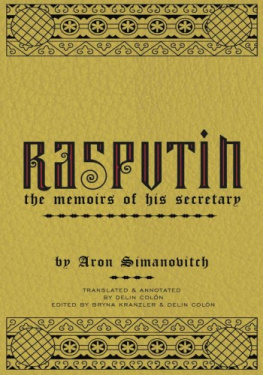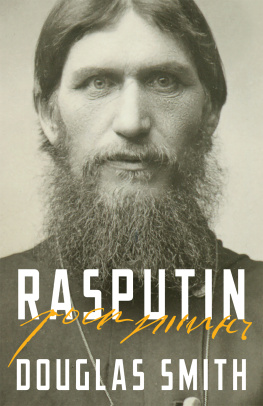RASPUTIN
For Barbara
RASPUTIN
H AROLD S HUKMAN
First published in 2009
The History Press
The Mill, Brimscombe Port
Stroud, Gloucestershire, GL 5 2 QG
www.thehistorypress.co.uk
This ebook edition first published in 2011
All rights reserved
Harold Shukman, 1997, 2009, 2011
The right of Harold Shukman, to be identified as the Author of this work has been asserted in accordance with the Copyrights, Designs and Patents Act 1988.
This ebook is copyright material and must not be copied, reproduced, transferred, distributed, leased, licensed or publicly performed or used in any way except as specifically permitted in writing by the publishers, as allowed under the terms and conditions under which it was purchased or as strictly permitted by applicable copyright law. Any unauthorised distribution or use of this text may be a direct infringement of the authors and publishers rights, and those responsible may be liable in law accordingly.
EPUB ISBN 978 0 7524 7073 3
MOBI ISBN 978 0 7524 7074 0
Original typesetting by The History Press
C ONTENTS
C HRONOLOGY
| 22 Jan. 1869 | Birth of Gregory Yefimovich Rasputin in Pokrovskoe, Tobolsk Province, Siberia |
| 1888 or 1889 | Rasputin marries Praskovia Dubrovina |
| 26 Nov. 1894 | Nicholas marries Alix of Hesse |
| 7 May 1896 | Coronation of Nicholas II in Moscow |
| 1901 | Philippe Vachod, the French clairvoyant, introduced to empress |
| 1903 | Rasputin arrives in St Petersburg, returns to Siberia after five months |
| 4 Feb. 1904 | Outbreak of Russo-Japanese War |
| 12 Aug. 1904 | Birth of heir to the Russian throne, the Tsarevich Alexei |
| 22 Jan. 1905 | Bloody Sunday in St Petersburg |
| 17 Feb. 1905 | Grand Duke Sergei assassinated in Moscow |
| 5 Sept. 1905 | Russo-Japanese Peace Treaty of Portsmouth, New Hampshire |
| 20 Oct. 1905 | General strike |
| 30 Oct. 1905 | Nicholas II signs October Manifesto granting civil liberties |
| Autumn 1905 | Anna Vyrubova introduced to Nicholas and Alexandra |
| 14 Nov. 1905 | Rasputin meets tsar and tsarina |
| 10 May 1906 | First State Duma opens |
| 21 July 1906 | Duma dissolved |
| Nov. 1906 | Rasputin treats tsarevich for first time |
| 3 Mar. 1907 | Second Duma opens |
| 15 June 1907 | Second Duma dissolved, new electoral law announced |
| 20 Nov. 1907 | Third Duma opens |
| Summer 1909 | Rasputin and Father Iliodor tour monasteries and visit Pokrovskoe; Rasputin meets Prince Felix Yusupov |
| 1910 | Complaints about Rasputin by grand duchesses governess |
| Mar. 1911 | Prime Minister Stolypin sends Rasputin away from capital; Rasputin begins second pilgrimage to Jerusalem |
| 14 Sept. 1911 | Stolypin assassinated in Kiev |
| Dec. 1911 | Church tribunal investigates charges against Rasputin |
| Jan. 1912 | Prime Minister Kokovstev advises Rasputin to leave capital |
| 28 Nov. 1912 | Fourth, and last, Duma opens |
| 1914 | Rasputin meets Prince Andronnikov |
| Feb. 1914 | Prince Felix Yusupov marries tsars niece, Princess Irina |
| Spring 1914 | Rasputin meets Dmitri Rubinstein |
| June 1914 | Attempt on Rasputins life by Chionya Guseva |
| 1 Aug. 1914 | Germany declares war on Russia |
| Sept. 1914 | Rasputin returns to St Petersburg |
| Jan. 1915 | War minister dismissed, spy mania spreads |
| Mar. 1915 | Rasputin creates scandal at Yar Restaurant in Moscow, banished from capital; Princess Irina Yusupova gives birth to daughter |
| June 1915 | Anti-German riots in Moscow; Yusupovs father dismissed with ignominy as governor-general |
| July 1915 | Empress calls Rasputin back from Siberia; Rasputin urges tsar to take over supreme command |
| Aug. 1915 | Press campaign against Rasputin |
| 5 Sept. 1915 | Tsar takes over supreme command from Grand Duke Nikolai; Scandal over canonization of John of Tobolsk |
| 16 Sept. 1915 | Duma prorogued |
| Nov. 1915 | Rasputin secures appointment of Pitirim as Metropolitan of Petrograd |
| Feb. 1916 | Goremykin replaced by Stuermer as prime minister |
| Nov. 1916 | Duma reconvenes, Milyukov makes his treason or stupidity speech |
| 30 Dec. 1916 | Rasputin murdered |
| 4 Jan. 1917 | Rasputin buried at Tsarskoe Selo |
| Mar. 1917 | Riots in Petrograd; Provisional government formed; Nicholas abdicates, royal family placed under arrest; Rasputins body exhumed and burnt |
| April 1917 | Lenin arrives in Petrograd |
| July 1917 | Kerensky becomes prime minister |
| Aug. 1917 | Royal family removed to Tobolsk, Siberia |
| 7 Nov. 1917 | Bolsheviks seize power |
| 1918 | Volunteer Army formed by anti-Bolshevik generals |
| Mar. 1918 | SovietGerman Peace Treaty of Brest Litovsk ratified |
| May 1918 | Royal family moved to Ekaterinburg |
| July 1918 | Tsars brother and other grand dukes murdered |
| 29 July 1918 | Royal family murdered by Bolsheviks |
O NE
E ARLY D AYS
T he fall of an empire demands explanation in terms of historical forces that one expects to match the scale of the events themselves major war, economic collapse, social revolution. But individuals also have their place. It is, for instance, impossible to think of the Russian revolution without mentioning Nicholas II, Kerensky, Lenin or Trotsky. Yet among these names we also invariably encounter that of Gregory Rasputin, usually described as a drunken, lecherous pseudo-holy man, a debauched peasant whose baneful influence over the Empress Alexandra was to prove fatal to the Romanov dynasty. A small private museum has been opened in his birthplace which aims to show that his reputation as an utterly amoral and mercenary reprobate is based mostly on myth. He has featured in novels and films even in a pop song that opened with Ra, Ra, Rasputin/Lover of the Russian queen/Russias greatest love machine.
The purpose of this book is to identify the qualities that enabled Rasputin to enter Russian history, and that lent themselves to this sort of treatment, to ask what made the Romanov dynasty susceptible to his influence, and to explain why the relationship was ultimately disastrous.
We shall examine a number of related areas: the condition of Russia from the turn of the century to the First World War; the relationship between the tsar and society; religious attitudes among peasants and aristocrats. The activities of Rasputin can only be properly understood in the context of these settings.
Russia at the Turn of the Century
The vast multi-national empire was struggling to modernize: to continue the economic upsurge begun in the 1880s; to tackle peasant land-hunger by major reform; to enable popular participation in the political process by the introduction of a parliament, called the State Duma; and to raise public awareness by a huge expansion of the press and a reduction in state censorship.

